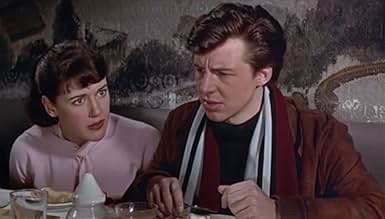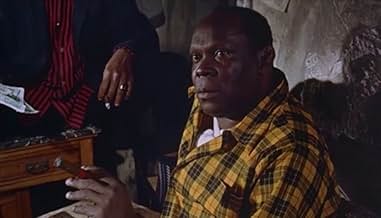IMDb RATING
7.2/10
2.9K
YOUR RATING
The murder of a young woman in London exposes deep racial tensions and prejudices inherent in the area.The murder of a young woman in London exposes deep racial tensions and prejudices inherent in the area.The murder of a young woman in London exposes deep racial tensions and prejudices inherent in the area.
- Won 1 BAFTA Award
- 3 wins & 4 nominations total
Thomas Baptiste
- Man on the Street
- (uncredited)
Victor Brooks
- Police Sergeant
- (uncredited)
Marie Burke
- Second landlady
- (uncredited)
- Director
- Writers
- All cast & crew
- Production, box office & more at IMDbPro
7.22.8K
1
2
3
4
5
6
7
8
9
10
Featured reviews
A really intense experience.
The real problem with television broadcasting is that the better movies of the last century are held from the viewers. SAPPHIRE could be shown as a double bill with AN INSPECTOR CALLS. There are not enough movie buffs to push some of these classics so that they can be shown to today's audiences ..which would really appreciate them.
Needs Re-Discovery
So who killed Sapphire. That's the movie's plot; however, the underlying theme is racial prejudice, a generally touchy topic at the time, even for British films. As I recall, the movie got more coverage than usual for a foreign release, at least in the LA area. The lovely Sapphire may look White, but genetically she's half-Black. Her troubles start when she "passes for White" in a London society still riven by prejudice. Engaged to the son of a reputable White family, her racial make-up causes rifts within the circle once her heritage is known. Naturally, the suspects start off with the family of her intended.
The twin threads of race and murder are skillfully woven into a difficult screenplay that nevertheless compels attention from start to finish. Credit a highly efficient performance from Nigel Patrick for holding together the disparate elements as his chief investigator works his way through London's many precincts. I like the way the screenplay portrays levels of racial dislike from both Whites and Blacks without getting too judgmental. Also, it looks like the exteriors were shot on location without any prettifying. Some of the neighborhoods in fact amount to about the last word in urban decay. Happily, director Deardon keeps things moving in unobtrusive fashion right down to the rather surprising finish. Anyway, the 90-some minutes amount to a topically compelling package that deserved its initial hoopla and still does.
The twin threads of race and murder are skillfully woven into a difficult screenplay that nevertheless compels attention from start to finish. Credit a highly efficient performance from Nigel Patrick for holding together the disparate elements as his chief investigator works his way through London's many precincts. I like the way the screenplay portrays levels of racial dislike from both Whites and Blacks without getting too judgmental. Also, it looks like the exteriors were shot on location without any prettifying. Some of the neighborhoods in fact amount to about the last word in urban decay. Happily, director Deardon keeps things moving in unobtrusive fashion right down to the rather surprising finish. Anyway, the 90-some minutes amount to a topically compelling package that deserved its initial hoopla and still does.
Deeply shocking crime investigation thriller exposing race hatreds
This is one of the most shocking films ever made about the true depths of colour prejudice in Britain in the 1950s, and the violent hatreds of black people harboured at that time by the white British working classes, especially in London. The film is well-scripted, and boldly directed by Basil Dearden, and it shows without flinching the true state of feeling as it was in those days (with some strong anti-white prejudice by blacks thrown in, to demonstrate that things are never only one way). What is so utterly horrifying about watching all of this now is, that it really was all true then. It is inevitable that some of the characters both white and black should resemble stereotypes, perhaps for the reason that at that time, people genuinely were stereotypes. The story concerns a police investigation of a murder of a young girl who was a student at the Royal Academy of Music (half way through the film a policeman calls it the Royal College of Music; Londoners are always confusing the two separate institutions in that way, so perhaps this script flaw merely reflects real life). Her body is found on Hampstead Heath in London, and there are no clues apart from the initial 'S' (her name is eventually discovered to be Sapphire). As a crime investigation thriller, the film is solid and extremely well done. A spectacular cameo performance is given by the black actor Robert Adams as 'Horace Big Cigar', not long before he died. The acting is all reliable and convincing. Dearden is especially good at not allowing any of the women and children to scream when discovering a body or having a horrible experience: his technique was extremely subtle, and they instead stifle screams, a scream begins to form, and then they put their own hands over their mouths in horror. When identifying a corpse, the actor behaves as one would naturally do, with numb paralysed shock, remaining silent and staring. All the ridiculous Hollywood histrionics and stock reactions of approved hysteria and screaming females are eliminated from this very British film, in which there is no place for hysteria except with one black character who panics for story reasons. Sociologists should really see this film. However, it is so incendiary that I cannot see it ever being released again or even being shown on television, at least not in Britain. In fact, some of the comments in the film may even have become 'illegal' under the harsh new race relations laws, even in a fictional context! Anyone who thinks race problems have gone away does not know human nature. Sensitivity to small differences, such as skin colour, is so firmly rooted in animal behaviour (the isolation by the herd of the black sheep, the driving away of albino animals from the pack), that race hatreds are inescapable, and can only be suppressed, never eradicated. Seeing this film reminds one of this depressing aspect of life by a blatant portrayal of it which is almost too painful to watch.
serious race issues discussed honestly
I was amazed by the shocking brutality of the racism in this film. In America, we are rarely presented with such casual racism; in films of the 50s, race is practically never dealt with in films, as Todd Haynes "remake" of Douglas Sirk's All That Heaven Allows tries to make up for. And current films about the 50s present such two dimensional characters that it is easy to tell the racist villains from the open-minded heroes. In Sapphire, filmed in Britain in the 1950s, one of the most interesting characters is Michael Craig's detective, supposedly our hero, but constantly making racist remarks. His comments are always countered by the more reasonable older inspector, but this allows his gradual transformation throughout the film. Although some of the film is a bit heavy-handed, ultimately the message is sadly still relevant. 4 out of 5.
One of the best British race films in existence
At first glance, SAPPHIRE seems to be your usual police procedural murder mystery thriller, with the superintendent and his supporting inspector (both played with bullish charm by Nigel Patrick and Michael Craig) investigating the discovery of a murdered girl in the local park. Indeed, their investigations initially take them down the usual alleyways as they explore the girl's social group, her relationship with a local lad, and some less-than-salubrious locations she was involved with.
However, where SAPPHIRE becomes something much, much more is in its context: race relations in Britain, circa 1959. It turns out that Sapphire herself was actually of mixed race, despite looking white. The discovery of her racial origins underpins the whole story and it's up to Patrick and Craig to unpin the build up to her brutal death. This is a shocking film, exploring the ugly face of racism in its matter-of-fact hatred of blacks and their creed. There's something grippingly realistic about it which makes it all the better film.
The supporting cast is very well picked. Nobody does shifty better than Paul Massie, the primary murder suspect. Earl Cameron is the model of race and refinement as the dead girl's brother. Yvonne Mitchell is superbly twitchy and Bernard Miles convincingly bigoted. Robert Adams supplies the one moment of true humour with his great cameo as Horace Big Cigar. As a film, SAPPHIRE is never less than thoroughly impressive, working well as a piece of social history as well as a fine detective story.
However, where SAPPHIRE becomes something much, much more is in its context: race relations in Britain, circa 1959. It turns out that Sapphire herself was actually of mixed race, despite looking white. The discovery of her racial origins underpins the whole story and it's up to Patrick and Craig to unpin the build up to her brutal death. This is a shocking film, exploring the ugly face of racism in its matter-of-fact hatred of blacks and their creed. There's something grippingly realistic about it which makes it all the better film.
The supporting cast is very well picked. Nobody does shifty better than Paul Massie, the primary murder suspect. Earl Cameron is the model of race and refinement as the dead girl's brother. Yvonne Mitchell is superbly twitchy and Bernard Miles convincingly bigoted. Robert Adams supplies the one moment of true humour with his great cameo as Horace Big Cigar. As a film, SAPPHIRE is never less than thoroughly impressive, working well as a piece of social history as well as a fine detective story.
Did you know
- TriviaThe success of this movie, in spite of its controversial themes, encouraged Janet Green to write Victim (1961), and Basil Dearden to direct it.
- GoofsThe ripped photo used as a clue appears in two versions from the first time it's discovered. The first version shows Sapphire laughing as she dances, with her mouth open. The second shows her smiling broadly with her jaw closed.
- Quotes
[last lines]
Superintendent Robert Hazard: We didn't solve anything, Phil. We just picked up the pieces.
- How long is Sapphire?Powered by Alexa
Details
Box office
- Budget
- $400,000 (estimated)
- Runtime
- 1h 32m(92 min)
- Aspect ratio
- 1.66 : 1
Contribute to this page
Suggest an edit or add missing content




































